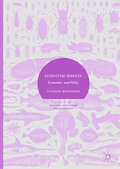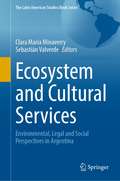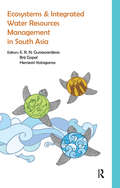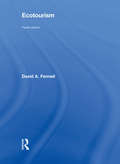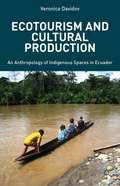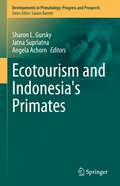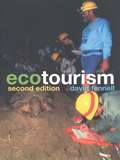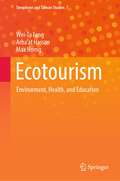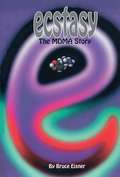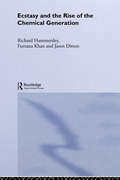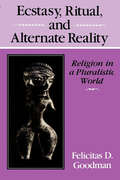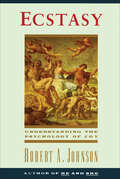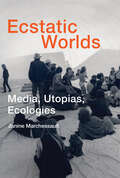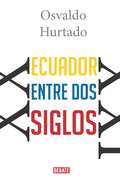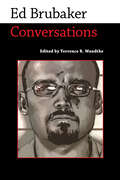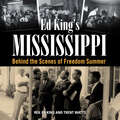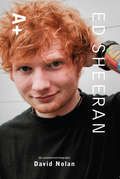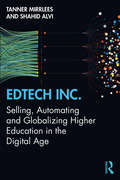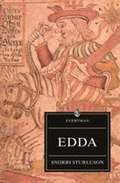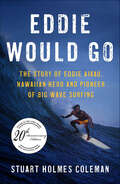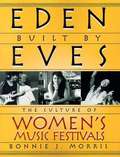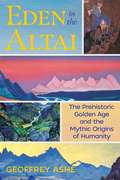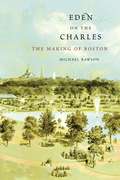- Table View
- List View
Ecosystem Services: Economics and Policy (Palgrave Studies in Natural Resource Management)
by Stephen MuddimanThis book bridges the gap between economic and ecological theory and practice. Its main focus is on how the principles of the Austrian School of economics could improve the validity of Ecosystem Services.The concept of ‘Ecosystem Services’ is a relatively recent innovation in environmental thought. The current system is dependent upon mainstream economic theory, in which monetary and fiscal policy controls the prevailing health of the economy. The dependence on this approach to finance, Muddiman argues, limits the potential of ecosystem services and exacerbates the effects of the existing flawed economic model. The book highlights the links between ecological and economic methodologies and concepts and outlines how the principles of Austrian Economic theory could provide better environmental outcomes. It then goes on to formulate approaches to ecosystem services which could act as drivers towards a new biodiversity-based economic framework built around distributed ledger technology, or ‘blockchain’. The key distinction of this book is its consideration of ecosystem services as a function of the current economic system. Using this as a starting point it investigates how an alternative economic model would achieve the integration of environmental considerations into economic decision making.
Ecosystem and Cultural Services: Environmental, Legal and Social Perspectives in Argentina (The Latin American Studies Book Series)
by Clara María Minaverry Sebastián ValverdeThis book describes cases and experiences in connection with environmental and cultural ecosystem services in Argentina. It contributes to the debate in connection with different approaches to analyse ecosystem services, focusing on the environment, the Law and social perspectives and concerns. Among the topics discussed are the implementation of the National Forests Act, the regulation and recognition of ecosystem services, the role of indigenous people, the policies in place for nature and forest conservation in different regions of Argentina. This book is one of the few research studies about cultural ecosystem services developed in Latin America and presents an attractive combination of the legal, environmental and social approaches and was written by an interdisciplinary team of academics who have theoretical and practical experience in this region where there is a valuable natural and cultural heritage.
Ecosystems and Integrated Water Resources Management in South Asia
by E. R. N. Gunawardena; Brij Gopal; Hemesiri KotagamaThis book provides an ecosystem perspective in addressing the water resource management issues in the South Asian region. It argues that aspects such as sources of water, its distribution and users; land–water interrelations; drivers of change such as laws, policies and institutions; management of issues and technologies related to water supply; institutional set-up; economic instruments such as pricing, taxes, subsidies; and economics of ecosystem services are crucial. Climate changes, melting of glaciers and polar ice caps, rising sea level and the increased frequency of extreme events, have to be factored into integrated management of water resources. This book addresses some of these major issues related to aquatic ecosystems and focuses on three major aspects: (a) concepts related to ecosystems, ecosystem services and their linkages with water; (b) human impacts on ecosystems, particularly the aquatic ecosystems, and their assessment; and (c) the management, including policy, governance and economics. Comprising new theories, research and case studies, the book will be useful those concerned with water resource management – professionals, students and researchers.
Ecotourism
by David A. FennellEcotourism continues to be embraced as the antithesis of mass tourism because of its promise of achieving sustainability through conservation mindedness, community development, education and learning, and the promotion of nature based activities that were sensitive to both ecological and social systems. The extent to which this promise has been realised is open to debate. Focusing on an array of economic, social and ecological inconsistencies that continue to plague ecotourism in theory and practice, the volume examines ecotourism in reference to other related forms of tourism, impacts, conservation, sustainability, education and interpretation, policy and governance, and the ethical imperative of ecotourism as these apply to the world’s greenest form of tourism. Ecotourism is a growing field attracting increasing attention from students and academics. Fennell provides an authoritative and comprehensive review of the most important issues that continue to both plague ecotourism and make it one of the most dynamic sectors in the tourism industry. It covers a comprehensive range of themes and geographical regions. Building on the success of prior editions, Ecotourism has been revised throughout to incorporate recent research and benefits from the introduction of real-life case studies and summaries of recent literature. An essential reference for those interested in Ecotourism, the book is accessible to students but retains the depth required for use by researchers and practitioners in the field. New chapters on the theory and application of animal ethics; community development in sustainable tourism; and education and learning in the field have added further value to an already very comprehensive volume. This book will be of interest to students across a range of disciplines including geography, economics, business, ethics, biology, and environmental studies.
Ecotourism And Cultural Production
by Veronica DavidovEcotourism is a unique facet of globalization, promising the possibility of reconciling the juggernaut of development with ecological/cultural conservation. Davidov offers a comparative analysis of the issue using a case study of indigenous Kichwa people of Ecuador and their interactions with globalization and transnational systems.
Ecotourism and Indonesia's Primates (Developments in Primatology: Progress and Prospects)
by Sharon L. Gursky Jatna Supriatna Angela AchornThe basic goal of the volume is to compile the most up to date research on the effect of ecotourism on Indonesia’s primates. The tremendous diversity of primates in Indonesia, in conjunction with the conservation issues facing the primates of this region, have created a crisis whereby many of Indonesia’s primates are threatened with extinction. Conservationists have developed the concept of “sustainable ecotourism” to fund conservation activities. National parks agencies worldwide receive as much as 84% of their funding from ecotourism. While ecotourism funds the majority of conservation activities, there have been very few studies that explore the effects of ecotourism on the habitat and species that they are designed to protect. It is the burgeoning use of “ecotourism” throughout Indonesia that has created a need for this volume where the successes and pitfalls at various sites can be identified and compared.
Ecotourism, NGOs and Development: A Critical Analysis (Contemporary Geographies of Leisure, Tourism and Mobility #Vol. 8)
by Jim ButcherEcotourism has emerged over the last twenty years not just as a market niche, but also as a strategy for combining development with conservation in the developing world. Ecotourism, NGOs and Development considers the basis for advocacy and argues that it is premised upon a very limited and limiting view of the potential for development. Jim Butcher examines the advocacy of tourism as sustainable development in a range of NGOs and within the general literature. The research reveals that in spite of the plethora of critical commentaries on the operation of ecotourism projects, there is generally an uncritical take on the ideological basis of the projects. This book offers a timely critique of key assumptions underlying ecotourism's status as sustainable development, arguing that ecotourism as development strategy ties the fate of some of the poorest people on the planet to localized environmental imperatives.
Ecotourism: An Introduction
by David A. FennellUsing a wealth of international case studies and photos, Ecotourism: An Introduction provides an accessible and comprehensive introduction to the key foundations, concepts and issues related to Ecotourism, the fasted growing segment of the global tourism industry. Among the topics covered are: * the foundations of ecotourism * tourism and ecotourism policy * the economics, marketing and management of ecotourism * the social and ecological impacts of tourism * ecotourism and development * the role of ethics in ecotourism The book includes case studies from Scotland, Austria, the USA, Canada, Mexico and Australia.
Ecotourism: Environment, Health, and Education (Sinophone and Taiwan Studies #7)
by Wei-Ta Fang Arba'at Hassan Max HorngThis book bridges the gap on the critical issues of ecotourism and direct economic assistance to the conservation of local ecological and human resources. It covers various topics and case studies by ecotourism destination and ecotourism route from Sinophone and Taiwanese perspectives. Each chapter of this book includes comprehensive proposes as an important core value for planning and operating ecotourism. According to Sustainable Development Goals (SDGs), this book highlights our balanced understanding of sustainable tourism from the perspective of human ecology. Ecotourism needs to integrate the perspectives of population biology, bioanthropology, biomedicine, and public health and strengthen the connection between human ecology and disease. It is here to provide a comprehensive guide to all fascinating places for ecotourism courses. We encourage the following persons to read relevant chapters: (1) ecotourism entrepreneurs: business operators such as homestays, hot springs, ecological farms, and travel agencies; (2) ecotourism researchers: scholars and experts, university (specialized) college students, primary and secondary school teachers, and other ecotourism, environmental education, resource conservation, tourism and dining, leisure and recreation, other related fields researchers; and (3) ecotourism practice management and planners.
Ecstasy
by Bruce Eisner Foreword by Stanley Krippner Introduction by Peter StaffordThe history of ecstasy, its discovery and use and social implications.
Ecstasy and the Rise of the Chemical Generation
by Richard Hammersley Jason Ditton Furzana KhanThis book about ecstacy users' lives is based on one of the biggest government-funded projects ever undertaken and gives voice to the chemical generation for the first time. In the UK, where the study was conducted, over fifty per cent of young people use drugs, a quarter of them regularly. The people in this book are ordinary, decent, family-loving people, with normal lives, normal problems and normal aspirations. Through their own words we hear how they first started using ecstasy, how they use it in different ways, why clubbing and raving are so important, how good sex is on ecstasy, how they chill out, how they come down, what problems they encountered and why they quit.This path-breaking book ends by trying to answer the questions on the lips of every member of the chemical generation: what are the long-term effects of ecstasy? Because we can't answer them, the authors claim, we are failing in our duty to our children: telling them not to take ecstasy is alienating and pointless.
Ecstasy, Ritual, and Alternate Reality: Religion in a Pluralistic World
by Felicitas D. GoodmanA cross-disciplinary exploration of comparative religion that offers a “unified field theory” of religion as human behavior.In this book, anthropologist and spiritual explorer Felicitas Goodman examines ritual, the religious trance, alternate reality, ethics and moral code, and the named category designating religion. The analysis is divided into two sections. The first reviews species-wide human traits that form the basis for religious behavior. Goodman, in speculative examination, traces the origins of religion to the dawn of human history, when religious ritual was accompanied by gesture rather than full-fledged modern speech. Ritual is seen as being the expression of the vastness of the drama of human life, death, birth, and procreation. The common neurophysiological basis for religious experience is seen to be a particular type of brain “tuning,” the religious altered state of consciousness, a trance facilitating contact with an alternate reality. The content of this other reality is shown to vary according to the type of adaptation to the habitat.The second section describes the religious systems of the world, dividing them according to societal type. A systematic comparison shows that religions vary according to whether people are hunter-gatherers, horticulturalists, agriculturalists, nomadic pastoralists, or city dwellers.“An important book which deserves the careful attention of serious students of religion.” —Religious Studies Review“Very few such global interpretations are ever attempted—and this one succeeds . . . The book’s importance is in the interpretation as well as in the rich data base materials the book presents.” —Willard Johnson
Ecstasy: Understanding the Psychology of Joy
by Robert A. JohnsonThe renowned Jungian psychologist and author of Transformation and Owning Your Own Shadow brings the hidden gift of ecstasy back into our lives.Robert A. Johnson has taken tens of thousands of readers on spiritual and psychological journeys towards inner transformation. In Ecstasy, he reconnects with the powerful and life-changing ecstatic element that lies dormant—but long-repressed—within us.Ecstasy was once considered a divine gift, Johnson tells us, one that could lift mortals out of ordinary reality and into higher world. But because Western culture has systematically repressed this ecstatic human impulse, we are unable to truly experience its transformative power.Johnson penetrates the surface of modern life to reveal the ancient dynamics of our humanity, pointing out practical means for achieving a healthy expression of our true inner selves. Through dreams, rituals, and celebrations, he shows us how to return to these original life-giving principles and restore inner harmony.
Ecstatic Worlds: Media, Utopias, Ecologies (Leonardo)
by Janine MarchessaultWhen media translate the world to the world: twentieth-century utopian projects including Edward Steichen's “Family of Man,” Jacques Cousteau's underwater films, and Buckminster Fuller's geoscope.janine
Ecuador entre dos siglos: Osvaldo Hurtado
by Osvaldo HurtadoLa continuación de El poder político en el Ecuador, compone una historia política, económica y cultural de Ecuador desde 1976 al presente. Ecuador entre dos siglos es el último eslabón de una trilogía sobre la realidad ecuatoriana, que comenzó con Dos mundos superpuestos y continuó con El poder político en el Ecuador, este último considerado una referencia, que cuarenta años después se sigue leyendo. Su autor fue presidente del Ecuador y ha sido protagonista de su historia reciente, primero desde el gobierno y luego como voz opositora a gobiernos como los de Febres-Cordero y Rafael Correa. Este libro es el resultado de una investigación rigurosa y objetiva que le permitirá al lector sacar sus propias conclusiones sobre la realidad actual del país.
Ed Brubaker: Conversations (Conversations with Comic Artists Series)
by Terrence R. WandtkeEd Brubaker (b. 1966) has emerged as one of the most popular, significant figures in art comics since the 1990s. Most famous as the man who killed Captain America in 2007, Brubaker's work on company-owned properties such as Batman and Captain America and creator-owned series like Criminal and Fatale live up to the usual expectations for the superhero and crime genres. And yet, Brubaker layers his stories with a keen self-awareness, applying his expansive knowledge of American comic book history to invigorate his work and challenge the dividing line between popular entertainment and high art. This collection of interviews explores the sophisticated artist's work, drawing upon the entire length of the award-winning Brubaker's career. With his stints writing Catwoman, Gotham Central, and Daredevil, Brubaker advanced the work of crime comic book writers through superhero stories informed by hard-boiled detective fiction and film noir. During his time on Captain America and his series Sleeper and Incognito, Brubaker revisited the conventions of the espionage thriller. With double agents who lose themselves in their jobs, the stories expose the arbitrary superhero standards of good and evil. In his series Criminal, Brubaker offered complex crime stories and, with a clear sense of the complicated lost world before the Comics Code, rejected crusading critic Fredric Wertham's myth of the innocence of early comics. Overall, Brubaker demonstrates his self-conscious methodology in these often little-known and hard-to-find interviews, worthwhile conversations in their own right as well as objects of study for both scholars and researchers.
Ed King's Mississippi: Behind the Scenes of Freedom Summer
by Trent Watts Rev. Ed KingEd King's Mississippi: Behind the Scenes of Freedom Summer features more than forty unpublished black-and-white photographs and substantial writings by the prominent civil rights activist Reverend Ed King. The images and text provide a unique perspective on Mississippi during the summer of 1964. Taken in Jackson, Greenwood, and Philadelphia, the photographs showcase informal images of Martin Luther King Jr., Andrew Young, Mississippi civil rights workers, and college student volunteers in the movement. Ed King's writings offer background and insights on the motivations and work of Freedom Summer volunteers, on the racial climate of Mississippi during the late 1950s and 1960s, and the grassroots effort by black Mississippians to enter the political arena and exercise their fundamental civil rights.Ed King, a native of Vicksburg and a Methodist minister, was a founder of the Mississippi Freedom Democratic Party and a key figure in the civil rights movement in the state in the 1960s. As one of the few white Mississippians with a leadership position in the movement, his words and photographs offer a rare behind-the-scenes chronicle of events in the state during Freedom Summer. Ed King is a retired faculty member of the School of Health Related Professions, University of Mississippi Medical Center. Historian Trent Watts furnishes a substantial introduction to the volume and offers background on the Freedom Summer campaign as well as a description of Ed King's civil rights activism from the late 1950s to the present day.
Ed Sheeran: A+ The Unauthorized Biography
by David NolanEd Sheeran is the Grammy-winning singer-songwriter with a tiny guitar and huge talent! From Sheeran's bohemian childhood to international stardom, read exclusive interviews with friends, relatives, musical collaborators, and key figures in his rise to success. The Grammy-nominated singer has toured with Taylor Swift, has performed with Elton John at the Grammys, and is just getting started! This biography details how Britain's hottest music star made his mark on the music industry playing by his own set of independent rules.David Nolan is an award-winning journalist with biographies on subjects ranging from Simon Cowell to the Sex Pistols.
EdTech Inc.: Selling, Automating and Globalizing Higher Education in the Digital Age
by Shahid Alvi Tanner MirrleesThis book advances a critical political economy approach to EdTech and analyses the economic, political and ideological structures and social power relations that shape the EdTech industries and drive EdTech’s development and diffusion. Particular attention is paid to the integration of EdTech with some of the most contentious developments of our time, including platformization and data-veillance, the automation of work and labor, and globalization-imperialism. By using a political economy of communication approach, this book will be of value to anyone interested in the current transformations of capitalism, the State, higher education and online learning in the digital age.
Edda
by Snorri Sturluson Anthony FaulkesOver a period of twenty years, Snorri Sturluson, scholar, courtier and poet, compiled the prose EDDA as a textbook for young poets who wished to praise kings. His work surveys the content, style and metres of traditional Viking poetry and includes a poem of Snorri's own, praising the king of Norway. Ironically, Snorri was killed in his own cellar in 1241 on the instigation of the king of Norway as a result of political intrigue. The EDDA contains the most extensive account of Norse myths and legends that has survived from the Middle Ages. This is the only edition available with introduction, text summaries, indexes and chronology of early Icelandic literature.
Eddie Would Go: The Story of Eddie Aikau, Hawaiian Hero and Pioneer of Big Wave Surfing
by Stuart Holmes ColemanThis biography of legendary Hawaiian surfer Eddie Aikau is “a homespun homage to a modern-day folk hero” (Outside Magazine).In the 1970s, a decade before bumper stickers and T-shirts bearing the phrase Eddie Would Go began popping up all over the Hawaiian islands and throughout the surfing world, Eddie Aikau was proving what it meant to be a “waterman.” As a fearless and gifted surfer, he rode the biggest waves in the world; as the first and most famous Waimea Bay lifeguard on the North Shore, he saved hundreds of lives from its treacherous waters; and as a proud Hawaiian, he sacrificed his life to save the crew aboard the voyaging canoe Hokule’a.From Stuart Holmes Coleman, Eddie Would Go is the “fascinating” story of Eddie Aikau’s life and legacy, a pipeline into the exhilarating world of surfing, and an important chronicle of the Hawaiian Renaissance and the emergence of modern Hawaii (San Francisco Chronicle).“Enlightening . . . an impressive history.” —Surfing Magazine“A meaningful biography of a surfing hero . . . extraordinary.” —San Diego Union-Tribune“Coleman, a surfer himself, does an admirable job of de-mystifying this remarkable man.” —St. Petersburg Times
Eden Built by Eves: The Culture of Women's Music Festivals
by Bonnie J. MorrisReaders take an exhilarating insider's journey through women's music festivals in the lesbian subculture complete with candid backstage interviews and photographs.
Eden in the Altai: The Prehistoric Golden Age and the Mythic Origins of Humanity
by Geoffrey AsheReveals how humanity’s first advanced culture originated in the Altai-Baikal region of southern Siberia • Explores how this prehistoric culture is the source of the pervasive mythic symbolism of the number 7, found in ancient cosmologies and myths around the world • Traces the Altaic influence on the Rishis of India, the creation of the Vedas, and the origin of the sacred legend of Mount Meru • Explains how the Hellenic cults of both Apollo and Artemis originated in southern Siberia as well as the pervasive bear symbolism found throughout the ancient world Myths of a Golden Age, a paradise at the beginning of human existence, are nearly universal in all cultures. But where was this “Eden” located? Refuting the traditional assumption that the cultures of the Middle East and Mycenae filtered northward into Europe and North Asia, noted historian Geoffrey Ashe instead identifies the northern Altai mountain range and Lake Baikal region of southern Siberia as the true cultural home of humanity and the source of the widespread myths of a prehistoric Golden Age. With evidence dating back as far as 24,000 BC, Ashe shows how the culture of prehistoric southern Siberia was matrifocal, Goddess-worshiping, and heavily shamanic and served as the progenitor of advanced ancient culture in the Western world, the missing link that later influenced Indian, Middle Eastern, Native American, and European society, culture, and religion. He reveals how ancient Altaic culture was the source of the pervasive mythic symbolism of the number 7, found in cosmologies and mythological traditions around the world, as well as reverence for the seven stars of Ursa Major, the Big Dipper, and the idea of a “sacred mountain to the North.” He traces the transmission of these cosmological beliefs into Babylon and ancient Greece by migrating tribes, including those that crossed the now-vanished land bridge to the New World. Ashe reveals how this transmission of beliefs had a profound influence on the seven-note musical scale, the seven astrological planets, and the seven vowels of the Greek alphabet, as well as the development of seven as a sacred number in Judaism. He shows how the ancient Altai-Baikal culture influenced the Rishis of India, the creation of the Vedas, and the sacred legend of Mount Meru. He also reveals how the Hellenic cults of both Apollo and Artemis originated in southern Siberia as well as the sacred bear symbolism found throughout the ancient world. Offering proof that advanced cultures existed in Europe before the immigration of Eastern peoples, Ashe shows that early societies did not look into the future for perfection but to the past, to the Golden Age of peace in the sacred northern mountains.
Eden on the Charles: The Making of Boston
by Michael RawsonDrinking a glass of tap water, strolling in a park, hopping a train for the suburbs: some aspects of city life are so familiar that we don’t think twice about them. But such simple actions are structured by complex relationships with our natural world. The contours of these relationships—social, cultural, political, economic, and legal—were established during America’s first great period of urbanization in the nineteenth century, and Boston, one of the earliest cities in America, often led the nation in designing them. A richly textured cultural and social history of the development of nineteenth-century Boston, this book provides a new environmental perspective on the creation of America’s first cities. Eden on the Charles explores how Bostonians channeled country lakes through miles of pipeline to provide clean water; dredged the ocean to deepen the harbor; filled tidal flats and covered the peninsula with houses, shops, and factories; and created a metropolitan system of parks and greenways, facilitating the conversion of fields into suburbs. The book shows how, in Boston, different class and ethnic groups brought rival ideas of nature and competing visions of a “city upon a hill” to the process of urbanization—and were forced to conform their goals to the realities of Boston’s distinctive natural setting. The outcomes of their battles for control over the city’s development were ultimately recorded in the very fabric of Boston itself. In Boston’s history, we find the seeds of the environmental relationships that—for better or worse—have defined urban America to this day.
